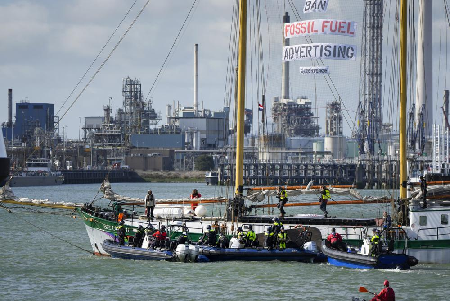
Dutch Pension Fund to Divest from Fossil Fuel Producers
October 26, 2021
DRBC Proposed Regulations Don’t Approach a FULL BAN on Fracking!
October 29, 2021By Cloey Callahan, Time Union, October 27, 2021
The NYS Department of Environmental Conservation (NYSDEC) denied operating permits for both Danskammer and Astoria gas power plants, citing that they would be in violation of the state’s climate law.
This victory is a tribute to both the work of Newburgh and Astoria residents and advocates across the region who have supported them, and a test to show the strength of our climate law— the Climate Leadership and Community Protection Act (CLCPA).
Congratulations to these community leaders in the Hudson Valley and New York City who fought fiercely against these power plants. This is OUR law, and it’s been proven effective in our climate fight and for clean air in environmentally burdened areas.
Read about the Astoria power plant here.
The New York State Department of Environmental Conservation (DEC) denied an air permit for Danskammer Energy Center near the Town of Newburgh in Orange County on Wednesday. The energy company was seeking authorization to build and operate a new natural gas-fired power generation facility and had submitted its application to the DEC in December 2019.
DEC Commissioner Basil Seggos said in a statement that the proposed project did not comply with the requirements of the state’s Climate Leadership and Community Protection Act (CLCPA), specifically the greenhouse gas limit.
The proposed expansion was the first large scale gas-fired power plant to be considered by state authorities since the 2019 passage of CLCPA, which calls for sharp reductions in the use of fossil fuels such as the natural gas that would power Danskammer.
The DEC on Wednesday also denied a permit for Astoria Gas Turbine Power, a wholly owned subsidiary of NRG Energy, and cited the same reason, saying the project would interfere with the statewide air emissions limit.
“We are delighted to see the DEC made this decision,” said Dan Shapley, Interim Riverkeeper and Vice President of Programs at Riverkeeper, a nonprofit environmental organization dedicated to protecting the Hudson River. “We’re glad to see the state is standing firm in the face of the reality that we need to reduce emissions, not increase them. This is a really important decision and a great day for our future.”
Danskammer Energy Center did not respond to a request for comment by the time of press.
The decision comes after a comprehensive review of Danskammer’s application and supporting materials, as well as more than 4,500 public comments received on the project between June and September of this year.
Danskammer was seeking authorization to construct and operate a new natural gas-fired combined-cycle power generation facility that could provide up to 600 megawatts of power, compared to the existing plant with its four smaller-capacity turbines.
The existing facility currently works as a “peaker” plant, meaning it runs only periodically when additional power is needed for the statewide grid. Such needs often are prompted by heat waves when more people run air conditioners. The proposed new turbine facility would have run more frequently.
Following the DEC ruling, Danskammer now has the right to request an administrative adjudicatory hearing regarding the denial of its application. The request must be made within 30 days.
The CLCPA was developed in response to the climate change crisis that mandates carbon emissions reductions. The law outlines goals of reaching 70 percent renewable energy by 2030 in New York, 100 percent zero-emission electricity by 2040 and an 85 percent reduction in greenhouse gas emissions by 2050.




